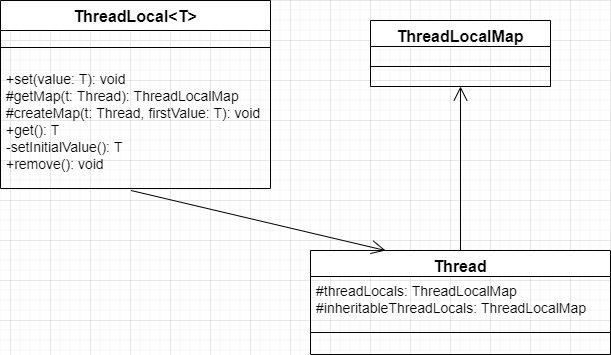ThreadLocal
ThreadLocal 即线程本地变量,也就是如果创建了一个ThreadLocal变量,那么访问这个变量的每个线程都会有这个变量的一个本地副本。当多个线程操作这个变量时,实际操作的是自己本地内存里面的变量,从而避免了线程安全问题。
ThreadLocal 实现原理
ThreadLocal 相关类类图如下:

如图所示,Thread 类中有threadLocals 和inheritableThreadLocals 两个ThreadLocalMap 类型的变量,而ThreadLocalMap 是一个定制化的hash map。以ThreadLocal 为键,任意对象为值的存储结构。
ThreadLocal 相关源码分析如下:
- void set(T value)
1
2
3
4
5
6
7
8
9
10
11
12
13
14
15
16
17
18
19
20public void set(T value) {
// 获取当前线程
Thread t = Thread.currentThread();
// 查找当前线程的线程变量threadLocals
ThreadLocalMap map = getMap(t);
if (map != null)
// 查找到线程变量则设置
map.set(this, value);
else
// 第一次调用创建当前线程对应的ThreadLocalMap
createMap(t, value);
}
ThreadLocalMap getMap(Thread t) {
return t.threadLocals;
}
void createMap(Thread t, T firstValue) {
t.threadLocals = new ThreadLocalMap(this, firstValue);
} - T get()
1
2
3
4
5
6
7
8
9
10
11
12
13
14
15
16
17
18
19
20
21
22
23
24
25
26
27
28
29
30
31
32
33
34public T get() {
// 获取当前线程
Thread t = Thread.currentThread();
// 获得当前线程的threadLocals 变量
ThreadLocalMap map = getMap(t);
// threadLocals 不为空则返回对应本地变量值
if (map != null) {
ThreadLocalMap.Entry e = map.getEntry(this);
if (e != null) {
T result = (T)e.value;
return result;
}
}
// threadLocals 为空则初始化当前线程的threadLocals 变量
return setInitialValue();
}
private T setInitialValue() {
// 初始化为null
T value = initialValue();
Thread t = Thread.currentThread();
ThreadLocalMap map = getMap(t);
// 设置当前线程threadLocals 为null
if (map != null)
map.set(this, value);
else
createMap(t, value);
return value;
}
protected T initialValue() {
return null;
} - void remove()
1
2
3
4
5
6
7public void remove() {
// 获得当前线程的threadLocals 变量
ThreadLocalMap m = getMap(Thread.currentThread());
if (m != null)
// threadLocals 不为空则删除当前线程本地变量值
m.remove(this);
}
需要注意的是:每个线程的本地变量存放在线程自己的内存变量threadLocals 中,如果当前线程一直不消亡, 那么这些本地变量会一直存在, 所以可能会造成内存溢出, 因此使用完毕后要记得调用ThreadLocal 的remove 方法删除对应线程的threadLocals 中的本地变量。
Threadlocal 不支持继承性
首先看下面一个例子:
1 | public class ThreadLocalTest { |
输出结果如下:
1 | main:thread local |
同一个ThreadLocal 变量在父线程中被设置值后, 在子线程中是获取不到的。因为在子线程thread 里面调用get 方法时当前线程为thread 线程,而这里调用set 方法设置线程变量的是main 线程,两者是不同的线程,自然子线程访问时返回null。但是可以使用InheritableThreadLocal 让子线程能访问到父线程中的值。
InheritableThreadLocal
源码如下:
1 | public class InheritableThreadLocal<T> extends ThreadLocal<T> { |
InheritableThreadLocal 继承自ThreadLocal,并重写了其中的三个方法,那么当第一次调用set 方法时,创建的是当前线程inheritableThreadLocals 变量而不是threadLocals。get 方法获取到的也是inheritableThreadLocals。
那么InheritableThreadLocal 如何让子线程可以访问父线程的本地变量?这要从创建Thread 的代码说起,查看Thread 类的默认构造函数,部分源码如下:
1 | public Thread(Runnable target) { |
那么只需要把【Threadlocal 不支持继承性】章节测试代码中的线程变量修改为:
1 | public static ThreadLocal<String> threadLocal = new InheritableThreadLocal<>(); |
运行结果如下:
1 | main:thread local |
使用场景:
- 子线程需要使用存放在threadlocal 变量中的用户登录信息
- 一些中间件需要把统一的id 追踪的整个调用链路记录下来
- ···
参考文献:
- Java并发编程之美
- Java并发编程的艺术